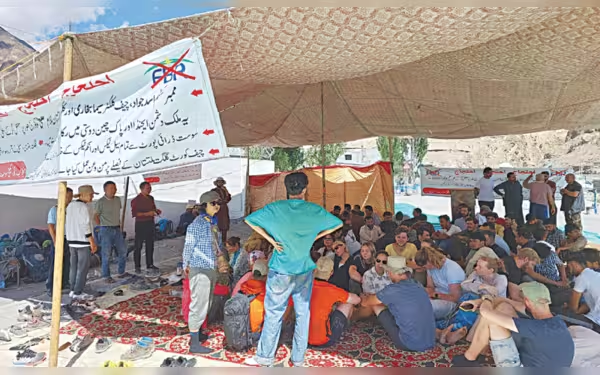Wednesday, January 15, 2025 02:02 PM
Gilgit-baltistan Traders Protest Against Federal Board Of Revenue
- Traders block Karakoram Highway for 13 days.
- Over 50 foreign tourists stranded at Sost Dry Port.
- Protesters demand inquiry into Customs officials' actions.
 Image Credits: dawn
Image Credits: dawnTraders in Gilgit-Baltistan protest against Federal Board of Revenue, blocking KKH and stranding foreign tourists for 13 days.
In Gilgit-Baltistan, traders are currently engaged in a significant protest against the Federal Board of Revenue and Pakistan Customs. This protest has escalated to the point where demonstrators have blocked the Karakoram Highway (KKH), a crucial route for the China-Pakistan Economic Corridor (CPEC). The blockade has severely impacted travel and trade between Pakistan and China, particularly through the Khunjerab Pass, leaving many foreign tourists stranded.
The protest, which is now in its 13th day, is primarily organized by those involved in trade between the two countries. They are demanding that the authorities implement a court decision that favors their claims. As a result of the ongoing demonstrations, both foreign and local passengers have been unable to travel by road to China. While some foreign tourists have recently been permitted to continue their journey, local travelers and transporters have faced a blockade for five consecutive days.
At Sost, a key point for trade, a sit-in protest has been established on the KKH, effectively blocking all entry and exit points between Pakistan and China. Over 50 foreign tourists, including individuals from the United Kingdom, Spain, France, and China, are currently stuck at Sost Dry Port due to the protest. Many of these tourists are facing difficulties as their visas are expiring. In a show of solidarity, these travelers have joined the traders' sit-in, appealing for permission to continue their journey to China. However, the protest organizers have requested that they wait for a decision.
The protest has attracted a diverse group of participants, including traders, laborers, transporters, customs clearing agents, and members of various political, religious, and social organizations. Key figures in the protest, such as Javed Hussain, Mohammad Abbas, and Mehboob Rabbani, have voiced their concerns regarding the suspension of trade activities between Pakistan and China, which they attribute to the policies of Pakistan Customs officials. The Gilgit-Baltistan chief court has already ruled that the collection of income tax, sales tax, and additional sales tax on imported goods from China through Khunjerab Pass is unlawful. Furthermore, the GB assembly has passed a resolution supporting the traders' demands.
Protesters have accused the Customs member, chief collector North, and the GB customs collector of being responsible for the deteriorating situation, alleging that they are part of a "conspiracy" against the longstanding friendship and historical ties between Pakistan and China. They are demanding immediate suspension of these officials and a high-level inquiry into their actions. The traders have made it clear that they will end their protest only after their demands are met.
This ongoing situation highlights the critical importance of trade relations between Pakistan and China, as well as the need for effective communication and resolution of disputes to ensure smooth operations at border crossings. The outcome of this protest could have lasting implications for future trade and travel in the region.













